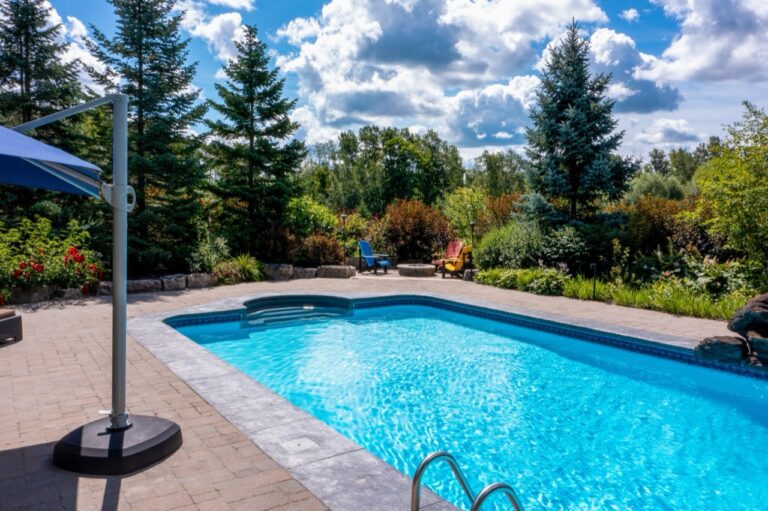There’s something undeniably appealing about owning a home with a pool. The image of lounging in your backyard, drink in hand, while the sun sparkles on the water is hard to beat. But is that dream home with a pool really as perfect as it looks?
Whether you’re imagining summer barbecues with the kids or a private retreat for peaceful swims, buying a home with a pool comes with both perks and responsibilities. Before you dive in, make sure you know what to look for so you don’t get stuck with unexpected costs—or worse, safety issues.
Why Pools Can Be Both a Luxury and a Liability
A pool can absolutely add to the value and enjoyment of a property, but it also introduces a whole new layer of complexity when you’re buying a home. Unlike cosmetic upgrades, pools involve mechanical systems, electrical wiring, plumbing, landscaping, safety compliance, and long-term maintenance.
The question isn’t “should I buy a house with a pool?”—it’s “what do I need to know before I do?”
1. Have the Pool Professionally Inspected
A general home inspection won’t go deep enough into the condition of the pool, so it’s important to hire a pool specialist as part of your purchase due diligence. A certified pool inspector can assess the age and function of:
- The pump and filtration system
- Heating elements (gas or electric)
- Liners, tiles, or plaster finish
- Decking and concrete cracks
- Drainage and grading around the pool
- Safety features (fencing, gates, alarms)
A professional will spot problems that even an experienced homeowner could miss. Depending on what they find, you may want to negotiate repairs or price adjustments with the seller.
Recommended Reading: Why You Don’t Want to Skip Your Home Inspection
2. Understand Seasonal Maintenance and Costs
Pools require ongoing maintenance to stay safe, clean, and operational—especially in Canada, where harsh winters mean seasonal closings and openings.
Ongoing pool ownership costs may include:
- Weekly or monthly chemical balancing
- Equipment replacement every few years
- Water and energy usage (especially with heaters)
- Pool opening/closing services ($300–$500 annually)
- Insurance coverage adjustments
- Potential fencing or cover upgrades for safety compliance
Ask the current homeowner for past bills and service records so you can get a realistic sense of what it costs to maintain.
3. Check Local Bylaws and Safety Codes
In Ontario, and in many other provinces, municipalities have specific bylaws about residential pools, including:
- Minimum fencing requirements (usually at least 1.2m high)
- Self-latching gates
- Pool enclosure permits
- Barrier placement from the home
Each city may have different rules, so check with the local building department before finalizing the deal. If the pool doesn’t meet current codes, you may be required to make upgrades—at your expense.
For example, here are Guelph’s local regulations, permit requirements, and safety standards for residential pools and hot tubs.
4. Think About Insurance and Liability
A backyard pool can increase your liability as a homeowner. In some cases, it may also increase your home insurance premiums.
Speak to your insurance provider about:
- How the pool will affect your premium
- What’s covered (e.g., injury, water damage)
- Whether diving boards or slides are excluded
- Additional coverage for pool-related structures like cabanas or heaters
This will help you avoid surprises if something goes wrong down the line.
5. Evaluate Long-Term Suitability
Ask yourself: will I actually use this pool, and does it make sense for my lifestyle?
A few things to consider:
- Will it increase or limit resale appeal in the future?
- Will you have time and budget to maintain it?
- Does it fit with how you plan to use the backyard?
Some buyers fall in love with the idea of a pool, only to find it’s more of a chore than a joy. On the other hand, for families or entertainers, it can be a major lifestyle upgrade.
6. Don’t Forget About Utilities
A pool can have a noticeable impact on your monthly utility bills. Heaters, filters, pumps, and pool lights all draw power—and if you’re using a gas heater or topping up water frequently, you’ll see that reflected in your bills.
Request past utility statements from the seller or real estate agent so you can factor that into your monthly budget.
7. Think Beyond Summer
Pools can add aesthetic value year-round, but keep in mind that for most Canadian homeowners, they’re only usable 3–4 months a year. The rest of the time, they require upkeep and add little to your daily life.
Ask yourself:
- Is the trade-off worth it for you?
- Are you willing to put in the work (or hire help)?
- Will it still feel like a benefit in February?
Final Thoughts
Buying a home with a pool isn’t just about luxury—it’s about understanding what you’re taking on. When well-maintained, a pool can be a beautiful extension of your home and lifestyle. But if ignored, it can become a financial and safety burden.
Before you commit, have the right professionals inspect it, factor in the ongoing costs, and make sure it aligns with your future plans. The best backyard retreat is one that doesn’t come with regrets.
👉 Contact us if you have questions about financing a home with a pool or need help making sure your mortgage fits your real budget—not just your dream one.
